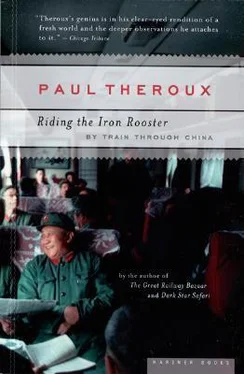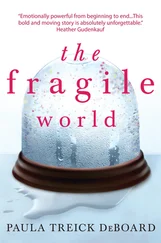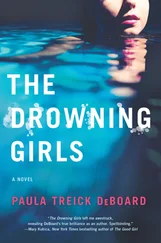The other thing about tours I had not known was their utter lack of privacy. It was all swapping names and information, almost from the first moment, and if you forgot their names they reminded you. It was mostly couples — the Cathcarts, the Scoonses, Cyril and Bug Winkle, the Westbetters, the Wittricks, the Gurneys; and the single people, who all seemed a little sad and uncertain and too eager, Wilma Perrick, Morris Least and his friend Kicker, an old Californian who called himself Blind Bob, a smiling cockney called Ashley Relph and a man known only as Morthole. There was Miss Wilkie, who stood no nonsense: she was from Morningside in Edinburgh. There was the leader, Mr. Knowles. He was Chris. I was Paul. They preferred first names and never asked me my surname.
In London Ashley Relph said he was dead keen to get to Hong Kong, and blinked, and whispered, "I hear you can get a life-sized latex model of your dick somewhere in Hong Kong. One of these Chinese places. Costs about a fiver."
Morris Least was from Arizona, traveling with his old army buddy, a loud-voiced man who urged us to call him Kicker. Kicker had been in the war. He had a metal plate in his skull. Morris and Kicker had matching jackets and shoes. They wore the same sort of crushproof hat. The two American veterans were in their late sixties, and although they were bad-tempered, they agreed on everything. It seemed to me that these two men had entered into a profound sort of marriage.
Kicker said, "I've never been to Europe before. Amazing, huh? Like I was in the Marines for twenty-two years and never saw Europe. I was in China, though. Back in forty-six. Chingdow."
He had crooked teeth — a cruel smile. I asked him what he wanted to do most in Europe.
"See the Mona Lisa," he said. "And try the beer."
"I hear China's clean as a whistle," Rick Westbetter said.
Miss Wilkie said, "I've heard it's filthy."
Hoping to please her, Rick said, "But London's clean!"
"London's a shambles," Miss Wilkie said, and reminded him that she came from Edinburgh.
"London looks clean to us," Rick said, taking his wife's hand. Her name was Millie. She was sixty-three and wore track shoes. They were one of those oldish hand-holding couples who you're never quite sure are being happy or defiant.
"Of course it looks clean to you," Miss Wilkie said. "Americans have lower standards than we do."
Bella Scoons said in her Western Australian whine, "How far are you going, Miss Wilkie?"
"Hong Kong," the old lady said.
Then everyone thought: Ten thousand miles and six weeks of this. Good lord.
At least I did.
The Scoonses were from Perth — the other side of Australia. Bella always measured distances by comparing them to the trip to Kalgoorlie. The distance from London to Paris was to Kalgoorlie and back. The trip to Berlin was "To Kalgoorlie, and back, and back again to Kalgoorlie." Moscow was seven trips to Kalgoorlie. And once I heard her mumbling, working out the distance to Irkutsk, in Siberia, and I heard her finish, "and back to Kalgoorlie."
When we set off from Victoria Station that rainy Saturday in April, Bella said to her husband Jack, "It's less than to Kalgoorlie." She was referring to the distance to Folkestone.
We had eaten breakfast at the Grosvenor Hotel. The Americans sat together, and the Australians were at another table; the British were at two tables, and three old men were silently eating alone. At a solitary table there was a couple in hiking gear — knapsacks and sling bags and cameras. I was eating my breakfast thinking: Is this a mistake? One of the old men was staring at me. It made me very uneasy, the way he was gaping, but then I noticed that his glasses were very thick, and thought that perhaps he was not staring at me, but only looking out of his glasses, the way people look out of windows on rainy days.
When we got on the train, I sat next to him. He said, 'This trip is kind of a big thing for me. My oculist told me I'm going blind and if there was anything I wanted to do before I went blind I should do it this year. So I'm going to China, and boy am I going to keep my eyes open. I figure, hey, it's my last chance, and hey, I'm going to enjoy it."
Then he told me his nickname was Blind Bob and that he was from Barstow in California. When I looked around this train I realized that I was one of a large group and that I did not know any of these people. All I had to go on were their faces. But faces say a great deal. Theirs certainly did. The sight made me very apprehensive.
They stared out of the train windows at the houses, and the houses returned the stares. One of the disconcerting aspects of a railway journey is that the houses near the line seem to have their backs turned to the traveler — you see rear entrances and drains and kitchens and laundry. But these are more telling than porticoes and lawns. The depressing thing about the London suburbs is not that they look seedy, but rather that they also look eternal. It is a relief to look inside those houses and see lives being lived — the man redecorating the bathroom, the woman feeding the cat, the girl upstairs combing her hair, the boy fiddling with his radio, the old lady with her nose in the Express. It is wrong to pass by in a train and not wish them well. They are unaware that they are being scrutinized. It is one of the paradoxes of railway lines that the passengers can see the people in the houses, but those people cannot see anything of the train passengers.
We were ferried across the Channel. Morris and Kicker reminisced about D Day and the Normandy landings and how the American troops got the worst of it.
The water was leaden looking and it slopped against the ferry. The wind from the northeast was cold. It blew hard across the quay when we landed, and we shuffled through customs to have our passports examined. Our luggage was searched.
At Boulogne, the people in the tour amused each other by calling out, "All aboard! All aboard!" and I discovered myself next to an English woman who was fat and entirely bald and wore mittens and said she was planning to immigrate to New Zealand. Her name was Wilma Perrick and she was about thirty-two. She said she had just lost her job. She seemed very sad, and I was on the point of sympathizing with her about her baldness when she leaned over and said, "What are you writing?"
When the Paris train started, the man known as Morthole said, "You were probably wondering what I was doing in the train yard on those tracks."
No one had been wondering. No one had seen him. Anyway, who was Morthole talking to?
"I was collecting rocks," he said. "I collect rocks from every country. Listen, in a lot of places it's illegal — the South Pole for example. I've got some rocks from the South Pole. They could put me in jail for that. I've got them from everywhere. Canada. Ohio. London. Each one is the size of a golf ball. I've got hundreds. I'm a kind of geologist, I guess."
In Elmer Gantry I read, "Set in between the larger boulders [of the fireplace] were pebbles, pink and brown and earth-colored, which the good bishop had picked up all over the world. This pebble, the bishop would chirp, guiding you about the room, was from the shore of the Jordan; this was a fragment of the Great Wall of China…"
The east wind that had blown coldly across the Channel that morning had brought a dusting of snow to Picardy. Snow in April! It lay in a thin covering on hillsides, like long, torn bed sheets, the earth showing through in black streaks. It made the ordinary-looking landscape seem dramatic, the way New Jersey looks in bad weather, made houses and fences emphatic, and brought a sort of cubism to villages that would otherwise have been unmemorable. Each place became a little frozen portrait in black and white.
Читать дальше












